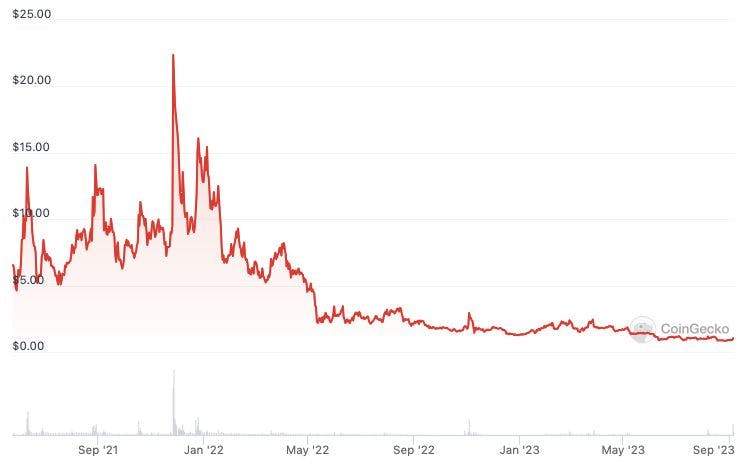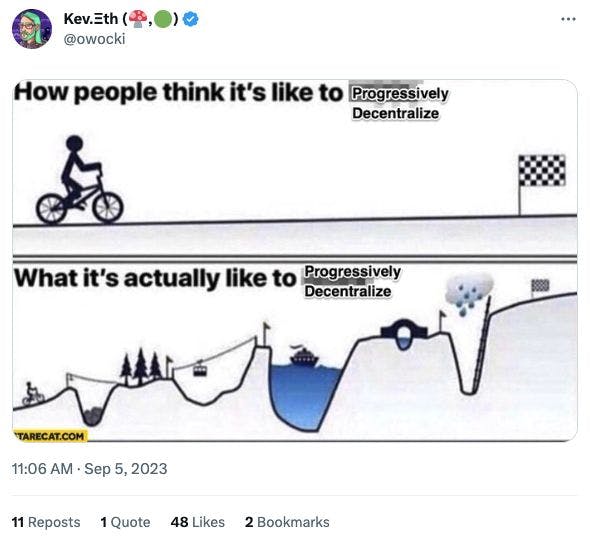A founder handing over the reins of a project to a decentralized community is a noble goal but can be difficult to execute.
In the latest example of the challenges faced by decentralized organizations (DAOs), Kevin Owocki, the founder of Gitcoin, plans to play an active role in the project once again, according to a Sept. 5 post.
“Over the last few months, I have heard variously from different people who think that things are going great for Gitcoin and also from people who think they are going poorly,” he wrote. Owocki left Gitcoin in June 2022 after starting the project in 2017.
Gitcoin’s flagship Grants product, which funds public goods through donations from the community, launched in 2019 and was quickly embraced by crypto enthusiasts as a way to support their favorite projects.
Controversial Moves
More recent initiatives have taken heat from the crypto community— in May, the project announced a funding round that included a diversity mandate. Many in the crypto community disagreed with making aspects of teams’ identities a criteria for eligibility.
In another controversial move, Gitcoin partnered with oil and gas conglomerate Shell to fund its climate-oriented rounds with $500,000 over 12 months.
It’s not the first time a founder has returned to a major crypto project in times of crisis — Kain Warwick rejoined Synthetix in 2021.
Prominent members of the crypto community have decried the current state of the project on social media. Martin Köppelmann, the co-founder of Gnosis, calls Gitcoin “almost unusable.”
David Mihal, who has received grants in the past for useful tools like CryptoFees.info, also noted that he had been rejected from recent funding rounds without apparent cause.
Need For Improved UX
In a follow-up interview with The Defiant, Mihal talked about how much he appreciated Gitcoin but also deplored the project’s user experience.
“Gitcoin is one of the best examples of how you can use this technology to do something good and helpful,” he said. “It’s something that’s really unique to crypto.”
Despite Gitcoin’s strong brand and mission, Mihal thinks the project isn’t living up to its potential. ”The tech has always been super buggy,” he said. “They have all the attention, the mindshare, the user base, but I don’t think they’re executing super well.”
Gitcoin certainly hasn’t received any goodwill from the price action of its GTC token — after the project airdropped $100M of the token in 2021, GTC has dropped with the rest of the crypto market and is down over 95% from its all-time high of $22.37.

Decentralized Tech
Owocki emphasized that the last three rounds of Gitcoin have been using a more decentralized tech stack. “From rounds 1 through 15, they ran on an old centralized product that was basically like a web 2.5 app,” he told The Defiant.
More broadly, Owocki emphasized that Gitcoin is closer to a piece of infrastructure than a traditional firm. “It used to be a company and now it’s a decentralized political economy,” he said. The process of decentralization has proved difficult for almost every project that has attempted it — new forms of accountability outside of a traditional employer-employee relationship need to be formed, which leaves opportunities for responsibilities to fall through the cracks.

As a facilitator of public goods, Gitcoin has to toe a fine line in terms of maintaining what Ethereum’s influential co-founder, Vitalik Buterin, has called “credible neutrality.”
“A mechanism is credibly neutral if just by looking at the mechanism’s design, it is easy to see that the mechanism does not discriminate for or against any specific people,” Buterin wrote in a 2020 article where he introduced the concept.
Moving forward, Owocki is still working out what returning to Gitcoin entails. He said he has talked with Synthetix’s Warwick as well as the controversial founder of MakerDAO, Rune Christensen, about what it’s like returning to a project after it’s already begun to decentralize.
Christensen has consistently made waves with his Endgame plan for Maker, which involves major changes to the protocol — the most recent controversy was the founder’s suggestion that Maker should fork the Solana blockchain.
Owocki said he doesn’t plan to shake up Gitcoin to the same degree. “I’ll be working on creating an ‘endgame’ for Gitcoin that’s more of a bottom-up synthesis of what the network thinks that we should be doing,” he said.
- SEO Powered Content & PR Distribution. Get Amplified Today.
- PlatoData.Network Vertical Generative Ai. Empower Yourself. Access Here.
- PlatoAiStream. Web3 Intelligence. Knowledge Amplified. Access Here.
- PlatoESG. Carbon, CleanTech, Energy, Environment, Solar, Waste Management. Access Here.
- PlatoHealth. Biotech and Clinical Trials Intelligence. Access Here.
- Source: https://thedefiant.io/gitcoin-founder-kevin-owocki-to-return
- :has
- :is
- :not
- :where
- $UP
- 000
- 1
- 100
- 12
- 12 months
- 15%
- 2017
- 2019
- 2020
- 2021
- 2022
- 710
- 95%
- 970
- a
- About
- According
- accountability
- Action
- active
- After
- again
- against
- All
- almost
- already
- also
- always
- an
- and
- announced
- Another
- any
- app
- apparent
- ARE
- article
- AS
- aspects
- At
- attempted
- attention
- base
- Basically
- BE
- been
- begun
- BEST
- Block
- blockchain
- brand
- broadly
- but
- Buterin
- by
- called
- CAN
- Cause
- centralized
- certainly
- challenges
- Changes
- Christensen
- closer
- Co-founder
- community
- company
- concept
- conglomerate
- consistently
- controversial
- controversy
- Creating
- crisis
- criteria
- crypto
- crypto community
- crypto enthusiasts
- Crypto Market
- Current
- Current state
- DAOs
- data
- Decentralization
- decentralize
- decentralized
- Degree
- Design
- different
- difficult
- Diversity
- do
- does
- Doesn’t
- doing
- don
- donations
- down
- dropped
- easy
- economy
- eligibility
- embraced
- emphasized
- enthusiasts
- Ethereum's
- Every
- example
- examples
- execute
- executing
- experience
- faced
- facilitator
- Fall
- Favorite
- few
- fine
- Firm
- First
- first time
- flagship
- For
- formed
- forms
- Forward
- founder
- founders
- from
- fund
- funding
- Funding Round
- funding rounds
- funds
- GAS
- Gitcoin
- Gnosis
- goal
- going
- good
- goods
- Goodwill
- grants
- great
- had
- Have
- he
- heard
- helpful
- Hidden
- High
- his
- How
- HTTPS
- i
- identities
- if
- improved
- in
- included
- Influential
- info
- Infrastructure
- initiatives
- Interview
- IT
- ITS
- jpg
- june
- just
- Last
- latest
- launched
- LG
- like
- Line
- living
- ll
- looking
- made
- Maintaining
- major
- maker
- MakerDao
- Making
- mandate
- many
- Market
- Martin
- max-width
- May..
- mechanism
- Media
- Members
- Mission
- months
- more
- most
- move
- much
- Need
- network
- Neutral
- neutrality
- New
- Noble
- now
- of
- Oil
- Oil and Gas
- Old
- on
- once
- ONE
- opportunities
- or
- organizations
- out
- outside
- over
- past
- People
- piece
- plan
- plato
- Plato Data Intelligence
- PlatoData
- Play
- political
- potential
- price
- PRICE ACTION
- process
- Product
- project
- projects
- protocol
- proved
- public
- quickly
- RE
- really
- received
- recent
- reins
- Rejected..
- relationship
- responsibilities
- REST
- return
- returning
- Role
- round
- rounds
- RUNE
- rune christensen
- s
- Said
- same
- see
- sept
- Shell
- should
- Social
- social media
- Solana
- solana blockchain
- something
- specific
- stack
- Starting
- State
- Still
- strong
- Super
- support
- Synthetix
- taken
- tech
- Technology
- terms
- than
- that
- The
- The Defiant
- their
- they
- things
- think
- Thinks
- this
- three
- Through
- time
- times
- to
- token
- told
- tools
- traditional
- unique
- use
- used
- User
- User Experience
- using
- vitalik
- vitalik buterin
- was
- waves
- Way..
- we
- web
- Web 2
- WELL
- What
- which
- WHO
- with
- without
- working
- working out
- wrote
- You
- zephyrnet














